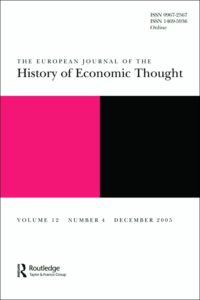EJHET special issue on “Coordination Issues in Historical Perspectives. Research programs, debates, and fate of a protean concept”
The European Journal of the History of Economic Thought
Special Issue on Coordination Issues in Historical Perspectives. Research programs, debates, and fate of a protean concept.
Since the days of Adam Smith (at least), economists have considered the price mechanism as a constitutive device for coordinating activities in complex market systems. Yet, it has also been noted that the price mechanism, as envisaged in ‘pure theory’, fails in many cases to coordinate intratemporal and intertemporal decisions, and that different mechanisms and modes may then (have to) come to operate in a substitutive or a complementary fashion. Issues of coordination failures and alternative mechanisms have received variable attention over time. They have sometimes been at the very heart of research programs and sometimes been totally bypassed. Intertemporal coordination failures, in particular, have been at the core of macroeconomics. While (neo-)classical economics argued that persistent unemployment has its roots in exogenous restrictions of price flexibility, Keynes (1936) questioned the role of price and wage adjustment as forces of self-correction, showing that wage and price flexibility could in fact have destabilizing effects (Howitt 2001). Keynes’ ideas paved the way for a long-term research program, making other economists think about coordination failures of the price mechanism in terms of disequilibrium adjustments. Lucas (1972), on the other hand, offered a framework based on Walrasian general equilibrium theory in which coordination issues were reduced to transitory problems resulting from informational imperfections. When Keynesian approaches regained attention in the 1980s and 1990s, the reference to disequilibrium dynamics had disappeared. Coordination issues came to be addressed in terms of multiple equilibria analysis. While microeconomics underwent profound changes through work in behavioral economics, experimental economics, agents-based modelling and other approaches that permit to investigate coordination issues in its realm, modern standard macroeconomics appears to leave many of the systemic coordination failures that were considered as relevant in the past out of its focus, if not its scope.
Following the award of an honorary doctorate from the University of Côte d’Azur (CNRS GREDEG) to Professor Peter Howitt on 8 September 2022, a workshop will be organised in cooperation with EJHET, the European Journal of the History of Economic Thought, on 9 and 10 September 2022. The workshop will bring together contributions that offer historical perspectives of the treatment of coordination issues in micro- and macroeconomics. Papers on specific research programs and modelling strategies or on debates and controversies in their historical context are welcome. A selection of the papers will be published in an EJHET special issue in 2023.
Submission Instructions
Proposals for papers (between 700 and 1000 words) should be submitted by email to muriel.dal-pont-legrand@univ-cotedazur.fr no later than 15 March 2022.
Authors whose proposal is accepted (by the end of March / early April) will be expected to send a full paper by 15 August 2022.
A selection of papers will be discussed during a workshop at Université Côte d’Azur, CNRS GREDEG (Nice, France) on 9-10 September 2022.
Final papers are to be submitted to EJHET by 15 December 2022 and will then be reviewed in line with the regular procedures of the journal.
